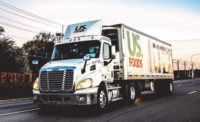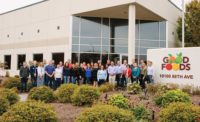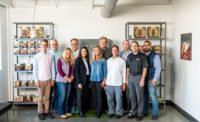When Sysco Corp. was founded in 1970, it was a $115 million company. Then, in 2009, Fortune magazine ranked the Houston, Texas-based foodservice distributor No. 204 in its annual Fortune 500 Companies in the world based on sales volume. The following year, Fortune magazine ranked Sysco as the 7th largest Fortune 500 Company in Texas and 55th largest in the United States by total revenue.
Today, Sysco is a $58 billion company, employs 67,000 associates in approximately 330 distribution facilities and serves more than 600,000 customer locations, including restaurants, healthcare and educational facilities and lodging establishments globally.
Discover how Sysco’s continued efforts in fleet optimization, energy efficiency and sustainable distribution deem it Refrigerated & Frozen Foods’ first annual Foodservice Distributor of the Year.
Growth in food and service
Sysco, an acronym for Systems and Services Co., lives “at the heart of food and service,” and continues to grow thanks to acquisitions and internal expansion of existing operations.
For instance, in October 2017, Sysco acquired HFM FoodService, a Honolulu, Hawaii-based broadline distributor with operations on all four major Hawaiian Islands and Guam.
Earlier this year, Sysco acquired Kent Frozen Foods, a UK-based foodservice distributor.
Then, in February, it acquired Doerle Food Services, a Broussard, La.-based broadline distributor, and North Star Seafood, a Pompano Beach, Fla.-based distributor of high-quality fresh and frozen seafood.
“Our businesses share many values, including a strong family heritage and customer-led culture and will benefit from complementary strengths and geography,” says Neil Russell, vice president, investor relations, communications and treasurer.
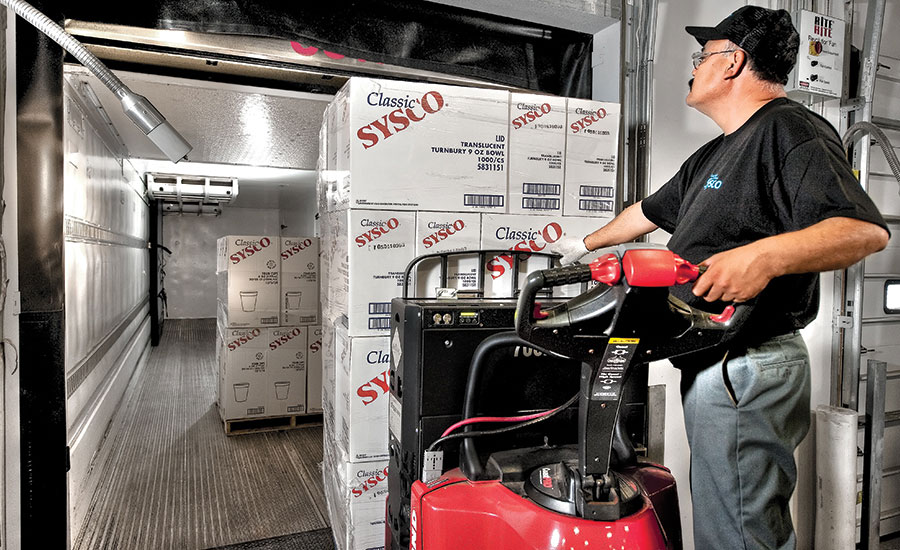
Sysco operates approximately 330 distribution facilities worldwide and serves more than 600,000 customer locations, including restaurants, healthcare and educational facilities and lodging establishments.
Cutting-edge new product development
On a bi-annual basis, Sysco launches new products available exclusively for customers through its Cutting Edge Solutions (CES) platform. The product concepts, developed by Sysco and sourced from leading and up-and-coming suppliers, are designed to help Sysco’s customers differentiate and grow their businesses.
“The goal of our Cutting Edge Solutions platform is to provide our customers with solutions to their challenges and inspire them to try new products, delight their patrons and grow their business,” says Russell. “Items launched under the CES Platform are stocked at all U.S. operating companies, which gives our customers the ability to easily add CES items to their menus. Sysco works with current and new suppliers to identify unique foodservice offerings, evaluate the items with our customers and field sales team and based on that feedback, select items to commercialize bi-annually.”
In September 2017, Sysco partnered with Beyond Meat, El Segundo, Calif., to launch the Beyond Burger through its CES program. This exclusive deal opened distribution of Beyond Burger, what is said to be the world’s first 100% plant-based burger, to thousands of burger joints, restaurant chains, hospitality properties, healthcare centers and educational facilities nationwide.
“Plant-based proteins are gaining traction with Sysco customers, and the innovation team continues to pursue additional opportunities in this space,” adds Russell.
Sysco also announced plans to expand its Sysco Atlanta facility, creating 100 new jobs within five years. The project will include an additional 100,000 square feet to the existing 562,000-square-foot building, including freezer space, cold dock space and a vehicle maintenance facility. The expansion will also feature a number of sustainability initiatives, including an ammonia refrigeration system, truck wash water recycling system, LED lighting in the freezer and cooler expansion areas and a battery charging station with rapid-charge technology.

Cutting Edge Solutions, Sysco’s product innovation platform, is designed to help customers differentiate and grow their businesses with new, on-trend, innovative products.
“When expanding our facilities, we evaluate opportunities to incorporate or improve sustainability initiatives,” adds Russell. “A great example of this is our FreshPoint facility in Central Florida. The new facility will have an 18,000-square-foot FreshPoint FreshCuts processing and production room for fresh-cut produce, and a system that takes waste (core, seeds, skin, etc.) and grinds it for compost-saving fuel and energy.”
Sysco is also working toward its goal of sourcing only cage-free eggs by 2026. Cage-free eggs make up approximately 10% of Sysco’s total egg sales.
“Our cage-free egg commitment builds on our long-standing practice to demand high standards in the humane treatment of animals sourced for its Sysco brand products,” adds Russell. “Since 2004, all Sysco brand shell egg suppliers have been certified by the United Egg Producers Animal Husbandry Guidelines and also undergo annual animal welfare audits. Sysco is committed to working through the supply chain to achieve a sustainable solution for both egg producers and our customers.”
New product development aside, food safety remains Sysco’s highest priority. In fact, Sysco maintains a committed team of more than 200 full-time associates and 35 contracted inspectors that conduct more than 1,600 on-site audits and inspections of partner locations annually.
“This team defines safety and quality standards, specifications and procedures, qualifies suppliers for Sysco branding, who must conform to expectations, monitors suppliers and products as they move through the supply chain, and reports compliance and performance of the food safety and QA management systems,” Russell says.
Sysco also maintains a commitment to support the Center for Produce Safety, Woodland, Calif., to continuously improve the delivery of safe produce. Sysco also follows the Good Agricultural Practices (GAP) program, which monitors nearly 700 suppliers, conducting over 10,000 GAP audits each year.
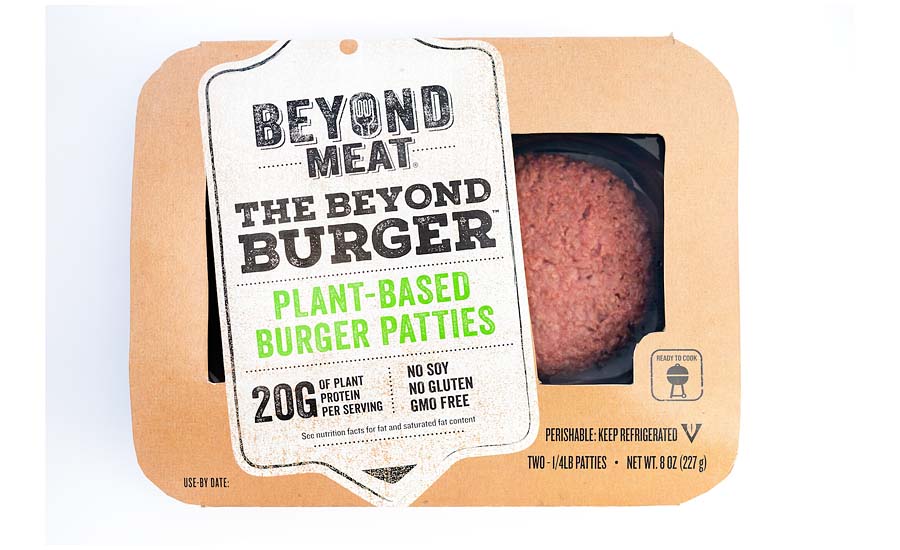
Beyond Meat partnered with Sysco to open distribution of its Beyond Burger to thousands of burger joints, restaurant chains, hospitality properties, healthcare centers and educational facilities nationwide.
Energy efficiency management
Since 2014, Sysco’s energy management program has increased energy efficiency nearly 10% across participating facilities. That’s because in FY2014, Sysco implemented a comprehensive recycling program across its U.S. broadline facilities to remove recyclables from the company’s solid waste stream, lower disposal costs and increase recycling tonnage and revenues.
Sysco designed a program that is "recycling-led," meaning it considers recycling options first before discarding into landfills or incinerators. According to the company, Sysco has recycled more than 40,000 tons of waste since the recycling program’s inception, which equates to approximately 520,000 trees conserved.
And, in 2017, Sysco pre-ordered 50 of Tesla’s new fully-electric semi tractors, offering up to 500 miles of range on a single charge. Tesla, San Carlos, Calif., will begin production in 2019.
“The Tesla semi opportunity was a great way for us to lead the industry and demonstrate our commitment to resource efficiency and reducing our carbon footprint. Electric-powered vehicles are quieter, more efficient, have less maintenance and a smaller environmental impact,” says Russell. “We are continuously exploring opportunities to improve resource efficiency and minimize the environmental impact of our fleet. As the leader in foodservice distribution, we feel it’s important to be on the forefront of emerging technologies. We are researching many alternative fuels, including hydrogen fuel cells, nitrogen-powered refrigeration, and of course, electric vehicles.”
Sysco is also working to incorporate fully electric semi tractors into its fleet, encourage integrated pest management and waste reduction through recycling, remove recyclables from its solid waste stream and signed a 10-year renewable energy agreement with NRG Energy, Inc., Houston, Texas, to construct three solar garden sites.
“The Texas Solar Garden Project is our first large-scale, off-site renewable energy purchase,” says Russell. “As part of the agreement, three solar gardens are being constructed in the Houston and Dallas areas that will support approximately 10% of our U.S. electricity usage. The project combines the benefits of a simple, traditional price structure with the environmental benefits of solar energy. It will reduce approximately 37,000 tons of CO2 emissions a year. This is equivalent to taking more than 7,000 cars off the road.”
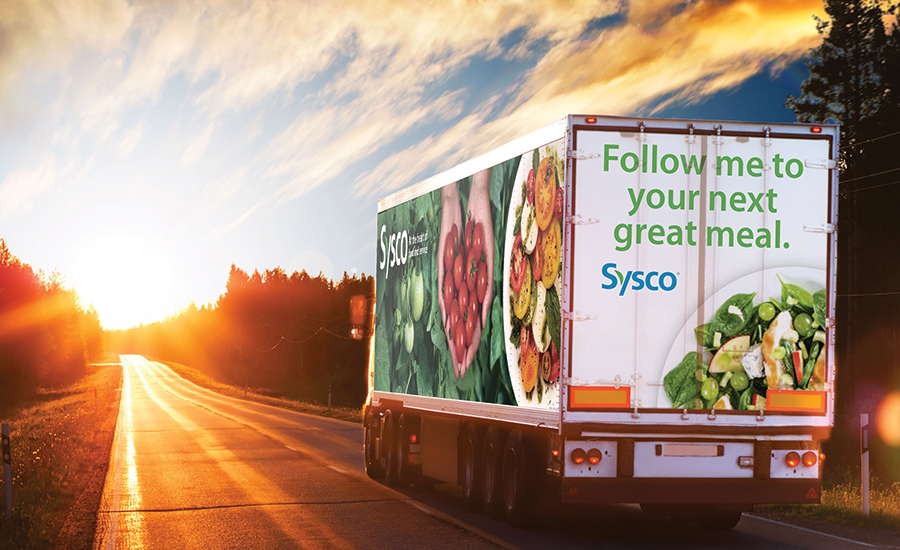
Sysco’s new brand tagline, “At the heart of food and service,” is starting to appear on trucks wraps fleet-wide.
The future of foodservice distribution
Shortly before going to press, Sysco released its 2025 corporate responsibility goals, designed to set a clear path for the future and demonstrate the company’s continued commitment to care for people, supply products responsibly and protect the planet.
Going forward, Sysco continues to optimize its overall supply chain network, make warehouse improvements, enforce recycling and waste management practices and reduce packaging, among other efforts.
2019 calls for an expansion of its “At the heart of food and service” brand tagline to appear on trucks wraps fleet-wide. Sysco plans for an increased focus on local and sustainable ingredients. And, it continues to revamp its online menu development portal to provide additional menu costing and production support.
“Sysco remains focused on growing our footprint in the right way, looking for business and market opportunities that are a good strategic fit for our company and business and that will enable us to better meet the needs of our customers and further enrich their experience of doing business with us,” says Russell.





